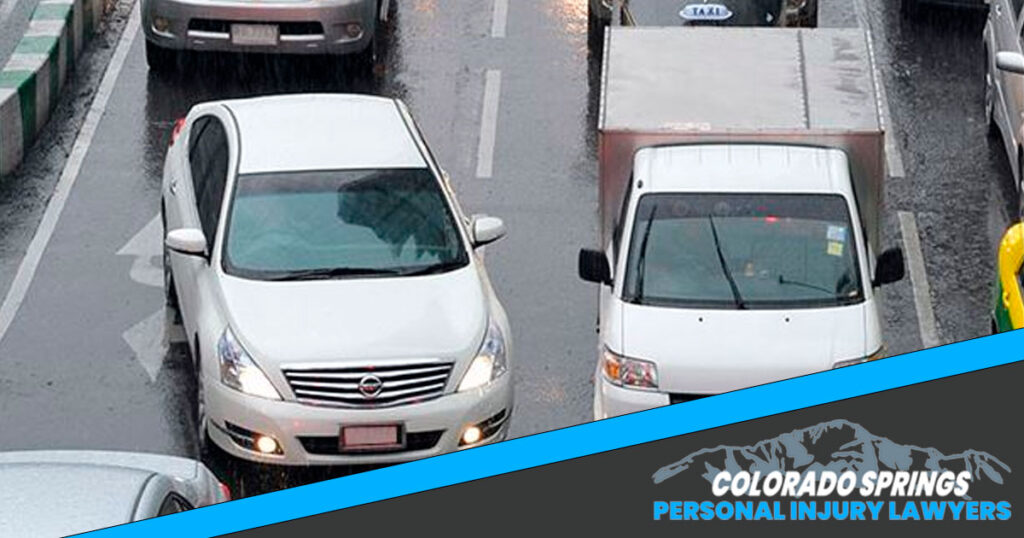Updated January 16, 2025 by Jonathon Douglas
Every driver knows that heart-stopping feeling of another car coming seemingly out of the blue into your blind spot. Mistakes during lane changes on the roads of Colorado Springs can have serious consequences. When drivers misjudge their maneuvers, accidents occur, leaving behind shattered lives and uncertainties. At the center of the subsequent legal processes lies fault determination, which affects injured parties, insurance claims, and overall road safety.
El Paso County, with its stunning mountains and ever-changing weather, throws some curveballs on the road. But when it comes to figuring out the blame for a lane change hiccup, you want to be on firm ground. In the aftermath of such accidents, determining who is at fault becomes crucial for obtaining justice and compensation. But as the legal proceedings unfold, those involved are faced with navigating a complex system of regulations.
Getting a firm grasp on how the rules of fault are applied to lane changes is critical for accident prevention. Furthermore, if an accident has unfortunately befallen you, get yourself a qualified Colorado Springs lane change accident attorney. Knowledge of road rules and expert legal support can make all the difference.
The Safe Five-Step Process To Changing Lanes
Step #1: Activate your turn signal.
Your trusty turn signals are the superheroes of lane changes – they communicate your intentions to other drivers. Remember to activate your blinker at least 100 feet before executing the maneuver, as required by law. Whether you’re merging into traffic or angling for a parking spot, using your turn signal is not only a safety essential but also a smart way to avoid pesky tickets. When stuck in a jam, that blinker might be your friendly plea for another driver to kindly let you merge ahead.
Step #2: Glance at your mirrors.
Once your trusty blinker is on, take a quick scan of your rearview and side mirrors. Ensure you have enough space in the desired lane before making that change. If there’s a vehicle already occupying the lane you want, exercise patience until you can see the entire vehicle (wheels included) and a bit of pavement in front of it in your rearview mirror.
Step #3: Glance over your shoulder.
Your mirrors might be great allies, but there’s always a sneaky area called the blind spot that deserves extra attention. After checking your mirrors, give a quick glance over your shoulder in the direction you plan to switch lanes. This final check ensures there aren’t any hidden surprises, such as cars or motorcycles lurking in that elusive spot. Don’t forget that smaller objects like cyclists can be easily missed, so keep both eyes peeled. Additionally, minimize the time spent in other drivers’ blind spots to decrease the chances of getting side-swiped.
Step #4: Smoothly change lanes.
Congratulations! You’ve assessed the situation, identified a safe opportunity, and now it’s time to execute the maneuver. Maintain your speed and gracefully move into the desired lane, ensuring a seamless transition.
Step #5: Turn off your turn signal.
The grand finale: turning off your turn signal like a pro! Avoid becoming the highway superstar with a constantly blinking blinker. Once you’ve smoothly transitioned into your chosen lane, promptly switch off your turn signal. There’s no need to announce your lane change to the world any longer – mission accomplished!
Who Has the Right-of-Way When Making A Lane Change?
There is one key way to remember the right-of-way when it comes to lane changes: the vehicle already in the lane you want to merge into has the priority! Allows safely yield to those with preference as you seek to enter their trajectory.
It’s important to note that simply signaling your intention to change lanes isn’t a magic wand that grants you automatic right of way. Sure, you should activate your indicators well in advance to inform others of your intentions. However, it’s equally vital to constantly scan your surroundings, consider the flow of traffic, and be aware of other drivers’ signals too.
What About Colorado Laws Specific to Lane Changes?
While usually only Colorado Springs lane change accident attorneys read the laws of the road, it’s key for each of us to know. Drivers in Colorado are required to adhere to Colorado statute Section 42-4-1007, which stipulates that they must remain within their designated lane until it is deemed safe to change lanes. Additionally, this law specifies that drivers should refrain from utilizing the center lane on three-lane roads, except for overtaking other vehicles.
Furthermore, Section 42-4-1003 outlines the protocols for passing another vehicle. Drivers must undertake this maneuver on the left side of the vehicle being overtaken, ensuring a safe distance before merging back into the right lane. The law specifically asserts that drivers being passed should yield their right-of-way to the overtaking car and avoid accelerating until the passing process has been completed.
One brand new change to the law just went into effect in 2023. It became clearly necessary after a police officer had to jump off a bridge to avoid being crushed when someone crashed into the back of his cruiser. This now means that all drivers must move over to the left to avoid any vehicle–whether emergency services or just a regular broken down pickup–has their lights flashing.
Factors Considered When Looking At Fault
A Colorado Springs lane change accident attorney is your best tool for determining fault. However, here are some of the ways the come to figure out where the blame falls:
Speed
Excessive speed during a lane change can contribute to accidents. When a driver fails to adjust speed to match traffic conditions, they are often considered negligent.
Signaling
Proper use of turn signals is a critical factor in fault determination. Failure to signal intentions can lead to a presumption of negligence.
Adherence to Traffic Rules
Violation of traffic rules, such as failure to yield, running red lights, or illegal lane changes, is a significant factor in assigning fault.
Driver Awareness
The level of awareness demonstrated by drivers in recognizing and responding to changing road conditions is assessed. Distracted driving is a key element in determining fault.
Road Conditions
Drivers are expected to safely adapt their behavior to challenging road conditions, such as the heavy snow which Colorado Springs frequently faces.
What Most Commonly Causes Lane Change Accidents?
To delve into the root causes of these incidents, we need to consider a multitude of factors, ranging from human behavior to environmental conditions.
Blind Spots
Blind spots, the deceptive culprits lurking over our shoulders, prove to be a treacherous threat when it comes to lane change accidents. Blind spots are situated exactly where we need to be going when making a lane-change. These concealed areas have a knack for tripping up unsuspecting drivers right at the worst of places.
Driver Distractions
One of the leading causes of lane change accidents is driver distraction. In the age of smartphones and constant connectivity, drivers often find themselves juggling various tasks while behind the wheel. Texting, phone calls, and in-car entertainment systems contribute to a lapse in focus, leading to critical errors during lane changes.
The Impact of Inexperience
Inexperienced drivers face a steep learning curve when it comes to navigating the complexities of lane changes. Lack of familiarity with the road, inadequate understanding of traffic patterns, and insufficient skills in reading blind spots contribute to the heightened risk of accidents.
Negligence in Signaling
A fundamental aspect of responsible lane changing is the proper use of turn signals. Negligence in signaling, whether intentional or due to oversight, can lead to confusion among other drivers, resulting in collisions. Understanding the importance of clear communication through signals is crucial in mitigating the risk of lane change accidents.
Colorado Springs Varied Weather Conditions
The Centennial State is known for its diverse weather conditions, from sunny days to sudden snowstorms. These variations create a dynamic driving environment that demands adaptability from motorists. Slippery roads, reduced visibility, and abrupt changes in weather can significantly impact the safety of lane changes.
Night Driving Challenges
Another environmental factor contributing to lane change accidents is night driving. Reduced visibility, impaired depth perception, and the potential for encountering fatigued or impaired drivers all elevate the risk of accidents during nighttime lane changes.
What Kinds of Injuries Usually Happen After A Collision From Changing Lanes?
One car sideswiping another while trying to transition from one lane to the next can cause a pretty serious crash. Cars can spin out, roll over, or end up crashing into a guardrail or lamp post. Whether a serious smash-up or just a little fender-bender, it’s likely the drivers will experience some kind of pain after. Make sure to always see a qualified medical professional after a crash. Some injuries aren’t apparent at first and you’ll want to be safe. This helps not just with your health, but also in the effort of collecting funds to cover all of your expenses. A Colorado Springs lane change accident attorney can help you calculate the cost of past and future care.
1. Whiplash
2. Back and neck injuries
4. Head and brain injuries
5. Broken bones
6. Soft tissue injuries
7. Internal or organ damage
8. Emotional distress
What Are Common Damages To A Vehicle From A Lane Change Accident?
A lane change accident can lead to various damages to a vehicle. After any collision, it’s advisable to have a qualified mechanic thoroughly inspect the vehicle to assess and address all potential damages promptly. Keep records of everything for your Colorado Springs lane change accident attorney. Common forms of damage include:
Body and Structural Damage
Collisions during a lane change often result in dents, scratches, or even significant deformations to a vehicle’s body panels. Structural integrity may also be compromised, affecting the overall stability and safety of the vehicle.
Bumper Damage
Rear-end collisions often occur during lane changes when the fender is clipped, causing damage to bumpers. This can range from minor scuffs and scratches to more severe structural damage, necessitating repairs or replacement.
Front Fender Damage
Misjudging a lane change can lead to side-swipe accidents, resulting in fender damage. Depending on the impact’s force, fenders may suffer dents, dings, or even become completely bent or dislodged.
Window and Mirror Damage
Collisions during a lane change can shatter windows or cause cracks in windshields. Additionally, side mirrors may be damaged or completely sheared off during the accident.
Wheel and Suspension Damage
Forceful impacts during a lane change can wreak havoc on the wheels and suspension system. Bent rims, misalignment, or broken axles are common issues that may require extensive repairs.
Mechanical and Electrical Problems
Lane change accidents may also affect a vehicle’s mechanical and electrical systems. Damage to components like the engine, transmission, cooling system, or electrical wiring can result in expensive repairs.
Contact A Colorado Springs Lane Change Accident Attorney Today
Following a lane change accident in the Colorado Springs area, your well-being and legal protection matter. That’s why we’re here to offer you a helping hand. Benefit from a free legal consultation tailored specifically to your situation.
Our team of experienced Colorado Springs lane change accident attorneys specialize in handling lane change accidents, seamlessly guiding you through the intricacies of Colorado Springs’ legal landscape. We understand the emotional distress and financial burdens that come with such incidents, and we are committed to fighting for your rights.
During your free consultation, a Colorado Springs lane change accident attorney discusses the details of your accident. They’ll carefully evaluate the circumstances and provide you with expert guidance. We’ll explain your options, outline potential avenues for compensation, and address any concerns you may have. Rest assured, our legal expertise combined with our deep understanding of local laws will ensure you receive the personalized support you deserve.
Protecting The Rights Of Colorado Springs Personal Injury Victims
Our goal is to help victims who have been seriously injured in an accident. At Colorado Springs Personal Injury Lawyers®, we work aggressively to help. We have substantial experience representing injured clients and dealing with insurance companies. Our skills allow us to work strategically and maximize your financial recovery.
For more information please contact us at Colorado Springs Personal Injury Lawyers® to schedule a free consultation with an attorney today.
Colorado Springs Personal Injury Lawyers
102 S Tejon St Suite 1100
Colorado Springs, CO 80903
(719) 888-4878

















